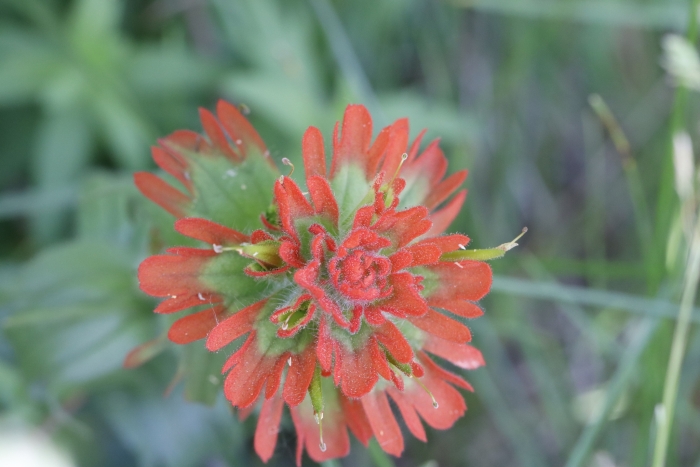Harsh Paintbrush
(Castilleja hispida)
Harsh Paintbrush (Castilleja hispida)
/
/

© Steve Walgenbach
CC BY 4.0
Image By:
© Steve Walgenbach
Recorded By:
Copyright:
CC BY 4.0
Copyright Notice:
Photo by: © Steve Walgenbach | License Type: CC BY 4.0 | License URL: http://creativecommons.org/licenses/by/4.0/ | Uploader: nulcheck | Publisher: iNaturalist |























Estimated Native Range
Summary
Castilleja hispida, commonly known as harsh paintbrush or harsh Indian paintbrush, is a perennial herb native to the Pacific Northwest of North America, including British Columbia, Alberta, Washington, Idaho, Montana, and Oregon. It is typically found in open habitats such as grassy slopes, dry meadows, and forest edges, often at low to middle elevations. This species reaches up to 24 inches in height and grows in clumps of ascending or erect, hairy stems. The inflorescence is characterized by bright orange to red bracts that are highly conspicuous and contain small, greenish flowers, blooming from late spring to early summer. The flowers are primarily pollinated by bumblebees (Bombus spp.). As a hemiparasite, harsh paintbrush can tap into the roots of other plants to obtain nutrients and water, which is essential for its survival in nutrient-poor soils.
Harsh paintbrush is valued for its vibrant bracts and its ability to attract pollinators, making it a unique addition to wildflower gardens and restoration projects. It is also of ecological importance, supporting endangered species such as Taylor’s checkerspot butterfly larvae. In cultivation, it requires well-drained soils and can tolerate a range of light conditions from full sun to partial shade. While it is not a high-maintenance plant, it does best with occasional watering during prolonged dry periods. There are no major disease issues, but its hemiparasitic nature should be considered when planting, as it will seek out and attach to the roots of neighboring plants.CC BY-SA 4.0
Harsh paintbrush is valued for its vibrant bracts and its ability to attract pollinators, making it a unique addition to wildflower gardens and restoration projects. It is also of ecological importance, supporting endangered species such as Taylor’s checkerspot butterfly larvae. In cultivation, it requires well-drained soils and can tolerate a range of light conditions from full sun to partial shade. While it is not a high-maintenance plant, it does best with occasional watering during prolonged dry periods. There are no major disease issues, but its hemiparasitic nature should be considered when planting, as it will seek out and attach to the roots of neighboring plants.CC BY-SA 4.0
Plant Description
- Plant Type: Shrub
- Height: 0.75-1.5 feet
- Width: 0.5-1.25 feet
- Growth Rate: Rapid
- Flower Color: Orange, Red, Yellow
- Flowering Season: Spring, Summer, Fall
- Leaf Retention: Deciduous, Semi-deciduous
Growth Requirements
- Sun: Full Sun, Part Shade
- Water: Low
- Drainage: Fast, Medium
Common Uses
Bee Garden, Butterfly Garden, Low Maintenance, Showy Flowers
Natural Habitat
Native to grassy slopes, dry meadows, and forest edges within the Pacific Northwest of North America
Other Names
Common Names: Hispid Indian Paintbrush , Harsh Indian Paintbrush , Bristly Paintbrush , Hispid Paintbrush
Scientific Names: Castilleja hispida , Castilleja angustifolia subsp. abbreviata , Castilleja angustifolia subsp. hispida , Castilleja angustifolia var. abbreviata , Castilleja angustifolia var. hispida , Castilleja hispida subsp. abbreviata , Castilleja remota
GBIF Accepted Name: